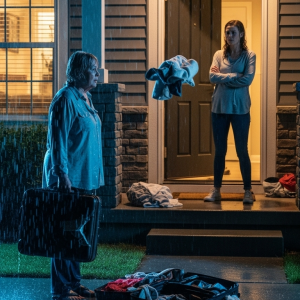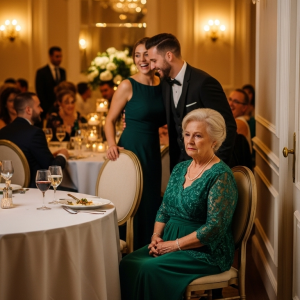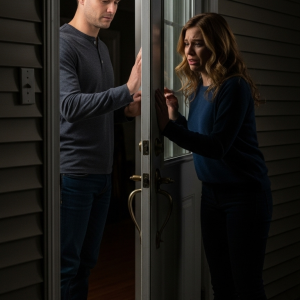At my daughter’s beach wedding, just as the sun was sinking into the waves off the coast of Cape Cod, her new husband leaned toward me. With a smirk that didn’t reach his eyes, he said, “Fifty thousand dollars for the luxury of being part of this celebration. Otherwise, you vanish from our lives forever.”
I blinked, trying to process the casual cruelty in his voice. Before I could respond, my daughter—my Rachel—added with a sip of champagne and a dismissive glance, “Or, you know, enjoy the peace and quiet of a retirement home. Your choice, Mom.”
They stood before me like a pair of polished porcelain figurines: glamorous, confident, and unshakable in their entitlement. I smiled, a slow, deliberate curving of my lips that felt foreign and powerful. I lifted my glass.
“You forgot one thing,” I whispered.
The air around us seemed to still. A gust of sea breeze lifted the edge of my shawl, and the sound of the waves crashing behind us filled the sudden silence. Their faces paled—not dramatically, but just enough for me to see the flicker of doubt, the edge of fear. I hadn’t raised my voice, but something in my tone, a certainty forged in fire, had landed a direct hit.
What they didn’t know was that I had been planning for this moment for months. I hadn’t come to this wedding to be humiliated. I came knowing exactly who they had become and what they thought I was. They believed I was weak, alone, and easy to discard. They forgot that I had built my life from nothing once before. And I could tear down theirs without ever raising my voice.
“You forgot one thing,” I repeated softly, letting the wind carry my words out to sea. Then, I excused myself to powder my nose, leaving them standing there, frozen. The storm they had summoned had already begun.
I was twenty-eight the night I left my old life behind. It was raining hard in Boston, the kind of rain that soaked you in seconds. Inside our cramped apartment, the silence was more chilling than the wind rattling the windows. My husband, Tom, had passed out on the couch, his rage spent for now. My cheek throbbed.
In the hallway, my four-year-old daughter stood barefoot, clutching a worn-out stuffed bunny. Her face was streaked with tears, but her eyes were wide and resigned—too wise for her age. That’s what did it. Not the bruises, but her eyes, and the fact that she no longer cried out. She had already learned that silence was safer.
In that moment, everything shifted. I moved quickly, packing a duffel bag with Rachel’s favorite clothes, our passports, and a hollowed-out copy of Pride and Prejudice where I’d hidden $237 in cash.
When I lifted Rachel into my arms, she wrapped herself around me. “Are we going on an adventure, Mommy?” she whispered.
“Yes, baby,” I said, my voice shaking. “The biggest adventure of all.”
We disappeared into the rainy night. A friend gave us a couch for a few weeks. It wasn’t much, but it was enough. I found a tiny one-room apartment that smelled of cabbage and cigarettes, but no one screamed there. I found work at a diner from 6 a.m. to 2 p.m., then answered phones at a dentist’s office from 3 p.m. to 9 p.m. I was always exhausted, but Rachel was safe. For the first time in years, I could breathe. That was the real beginning of our story.
Rachel got into Boston University on a partial scholarship. The day the acceptance letter came, she danced around our tiny kitchen, waving it like a golden ticket. That night, after she slept, I cried—tears of joy, but also of fear. What the scholarship didn’t cover, I would have to find.
I picked up extra shifts, took on evening cleaning jobs, and worked weekends in a stockroom. I kept going because that’s what mothers do. And Rachel thrived. She studied hard, made friends, and started dreaming of launching her own boutique—something elegant and modern.
After graduation, the call came late at night. “Mom,” she said, her voice trembling with excitement, “I think I found it. A storefront. It’s perfect. But I need help. I need startup money.”
She hesitated. “Ninety-seven thousand dollars.”
The number knocked the air out of me. It was more than my savings, but I had one last thing: my retirement fund. Modest, but consistent. A little tucked away every month for a “someday” that had never arrived.
The next day, I met with Sarah Miller, my old friend, now a paralegal. “You’re sure about this?” she asked as she reviewed the paperwork to liquidate my future. I was.
But Sarah added something extra: partnership papers. “You’ll retain 51% ownership,” she said firmly. “Rachel will be the face, but you’ll be protected. This isn’t about control; it’s about security.”
Rachel signed the papers without reading them. She was too busy dreaming. Three months later, “Rachel’s Closet” opened. The boutique was beautiful, she was radiant, and I was happy to be her silent partner. This was our dream.
The boutique grew. At first, it was slow. Rachel worked fourteen-hour days, and I helped in the background, restocking inventory and quietly covering unexpected costs. Then, one day, a lifestyle influencer posted a photo in one of Rachel’s dresses. The next morning, there was a line outside the store. “Rachel’s Closet” was on the map.
I watched it all with a swelling heart, but I only ever visited after closing. I knew I, with my old sweaters and sneakers, didn’t belong in her new, elegant world.
One night, I came by early with takeout to surprise her. I stood quietly by the racks, listening as a customer praised her. “How did you pull this off right out of college?” the woman asked.
Rachel smiled, confident and glowing. “I built it from nothing,” she said, her voice light as air. “Just hard work and a clear vision. No one handed me anything.”
Her words were knives. I built it from nothing. I turned and left without a word, the bag of food clutched in my hand. That was the night I realized I had been erased from her story. I wasn’t just in the background; I wasn’t in the narrative at all.
A few months later, Rachel met David Harrington. He was polished, wealthy, and exuded power. Within weeks, they were inseparable. My calls went unanswered as she was swept into his world of rooftop parties and Hamptons vacations.
I learned about their engagement from Facebook. No phone call. No warning.
Two days later, I received a message that wasn’t meant for me. It was a screenshot from David to Rachel: “Your mom can’t sit with my family at the dinner. My parents would be horrified. Put her at the vendor table.”
I stared at the screen, my heart pounding, waiting for her reply, for her to defend me. Nothing. Seven minutes later, a different message from her arrived: Mom, can you believe the florist wants $1200 for eucalyptus branches? This wedding is so stressful!
That night, I stopped by her apartment unannounced. Her laptop was open on the counter. There it was: a tab labeled “FMA Management.” It was a full strategy document, with bullet points outlining how to keep me out of sight at key moments, how to extract maximum financial support while minimizing my visibility. A comment from David read: “After the wedding, it’ll be easier to create distance.”
They weren’t just forgetting me. They were planning to use and discard me.
That’s when I called Sarah. “I need you,” I said. “And I need you not to ask questions yet.”
The next day, in her home office, I asked, “If I activate my majority ownership, what does that allow me to do?”
Sarah looked me in the eye. “It means you can initiate a full audit, freeze the business accounts, revoke unauthorized contracts, and if necessary, take back control.”
I nodded. “But I won’t move unless they give me a reason.”
She raised an eyebrow. “What will the trigger be?”
I didn’t answer then, but I knew. And it came on Rachel’s wedding day, when David turned to me and said with that polished smile, “$50,000. Pay it, or vanish forever.” That was the moment. The one they never saw coming.
I didn’t go to the restroom. I walked down a wooden boardwalk to a small alcove facing the ocean. Tucked away from the glittering reception, I pulled out my phone. The sun was setting, casting gold over the waves. I typed one sentence:
Sand castle time.
Within moments, Sarah replied: Understood. Package is delivering now. Legal team standingby. Are you okay?
I stared at the horizon. I will be.
I stayed on that bench for seven minutes, just long enough to let go of the last strand of hope. Then I stood and made my way back, observing unseen as the unraveling began. The wedding coordinator approached David’s parents, handing them a sealed envelope. Similar envelopes were delivered to tables around the venue—to every investor David had brought in. Inside each was a legal notice of an immediate audit and asset freeze, detailing financial irregularities.
Concern spread like wildfire. David’s father rose abruptly, his face a thundercloud. Phones buzzed as an automated email, sent from the company account now under my control, alerted all vendors and clients to an immediate business hold.
I stepped out of the shadows. Rachel rushed over, panic in her eyes. “Mom, what’s happening? Everyone’s getting these insane emails!”
“Not insane,” I said evenly. “Accurate. I’m exercising my rights as majority owner.”
David appeared beside her, his jaw clenched. “What have you done?” he hissed.
“I’ve protected my investment,” I replied calmly. “Did you think I wouldn’t notice the unauthorized investors? The missing funds funneled into your side projects?”
David’s face drained of color. Across the lawn, his father was now speaking furiously into his phone.
Rachel’s eyes filled with tears. “Mom, please, you have to fix this! Everything we’ve worked for—”
“Everything I worked for,” I corrected her gently.
“I’m your daughter!” she cried, reaching for me. “You can’t do this to me!”
That old instinct to protect, to forgive, stirred for one final moment. But then I remembered the spreadsheet, the vendor table, the chilling silence after the betrayal.
“I already did,” I said softly. “You showed me what I meant to you. I just finally believed it.”
Their phones rang again. Legal notices. Repercussions. They spiraled into panic. And I turned and walked away. Through the chaos, through the whispers, through the shame that no longer belonged to me. At the edge of the property, I slipped off my heels and stepped onto the cool sand.
Three miles down the beach, Sarah waited in her car. She didn’t ask questions, just smiled and opened the passenger door. In a quiet town north of the city, a new, modest storefront awaited—mine. I would build something small, simple, not on sacrifice, but on joy.
For the first time in decades, I wasn’t someone’s mother, someone’s backup plan, someone’s savings account. I was just me. And that was finally enough.
The sand was cool beneath my feet as I walked away from the Harrington family’s chaos. The sounds of the reception—raised voices, angry demands, the frantic scurry of staff—faded with each step. For the first time in years, my shoulders felt light.
When Sarah drove me north that night, neither of us spoke for the first thirty minutes. The road was dark, lined with silent pines. Finally, she glanced at me.
“You didn’t flinch once,” she said quietly.
“I flinched for years,” I answered, staring out at the blur of trees. “Tonight was the first time I didn’t.”
By morning, the scandal had cracked wide open. Harrington investors pulled out one by one. David’s father issued a scathing public statement distancing himself from his son. Rachel’s boutique accounts were frozen, her credit lines revoked.
News outlets picked up whispers of embezzlement. A glamorous wedding turned financial bloodbath—it was too juicy to ignore.
Sarah forwarded me a headline: “From Vows to Lawsuits: Harrington Heir’s Wedding Explodes in Chaos.”
I read it once, then closed my phone. It wasn’t joy I felt. It wasn’t even vengeance. It was something deeper—relief.
The storefront Sarah had found for me was small, tucked on a quiet corner of Rockport. The kind of place where the sea breeze carried the scent of salt into every crack of the old brick.
I painted the walls myself, a soft ivory, then lined the shelves with secondhand treasures: vintage linens, handmade pottery, books whose spines told their own stories.
The sign above the door read simply: “Harbor & Home.”
Every morning, I unlocked the door, lit a candle, and brewed coffee in a little French press I kept behind the counter. Locals began to drift in, curious at first, then loyal. An elderly woman bought teacups for her granddaughter. A fisherman’s wife came every week for lavender soap. A young couple furnished their first apartment with my mismatched chairs.
No one asked about my past. No one cared whose mother I was.
For the first time in decades, I wasn’t an accessory in someone else’s story. I was the story.
It was late autumn when she came.
Rain battered the windows. The shop was empty except for me, a lamp casting warm light across the counter. The bell above the door jingled, and I looked up.
Rachel.
Her once-polished hair was frizzy from the storm. Her designer coat clung damp to her frame. Her eyes—once sharp, confident—looked hollow.
“Mom,” she whispered, her voice trembling.
I set down the ledger and folded my hands. “Rachel.”
For a moment, silence stretched between us, filled only by the rain hammering outside.
“I didn’t know where else to go,” she said finally, her voice cracking. “David’s gone. He left when the lawsuits started. They’re saying I could be liable too. I…I don’t have anything. I don’t even have a place to stay tonight.”
I felt the old instinct rising—the urge to pull her close, to shelter her. But I stayed still.
“You had a place,” I said evenly. “You burned it down yourself.”
Tears spilled down her cheeks. “I was stupid, Mom. I thought I was proving myself. I thought if I looked strong, I’d be free. I didn’t see what I was doing to you.”
Her words pierced me, but I forced myself to remember the spreadsheet, the vendor table, the silence after betrayal.
“You didn’t just not see,” I said softly. “You chose not to.”
Rachel dropped into a chair, sobbing into her hands. “Please, Mom. Just one more chance. I’ll do anything.”
I stood, walked to the window, and watched the rain streak down the glass. My reflection looked back at me—not invisible, not erased. Solid.
Behind me, Rachel’s sobs quieted into broken whispers. “I don’t know who I am without you.”
Slowly, I turned.
“Then maybe it’s time you find out.”
Her head snapped up, eyes wide.
“I won’t let you drown,” I added, my voice steady. “But I won’t carry you anymore either.”
I wrote down the address of a shelter that helped women restart their lives. I slid the paper across the counter.
“They’ll help you. If you want real change, you’ll take it. If not—” I shrugged. “That’s your choice.”
Rachel stared at the slip of paper as if it were both salvation and condemnation.
She rose slowly, her wet coat dripping onto the floor. She clutched the paper like a lifeline. For the first time in years, she looked small.
“Do you still love me?” she whispered.
My throat tightened, but I held her gaze. “Always. But love doesn’t mean blind forgiveness. It means truth. And the truth is—you have to build yourself now.”
She nodded, tears streaming silently. Then she left, the bell above the door jingling one last time.
Months passed. Rachel did not return, but I heard whispers—she was working at a thrift store, attending therapy, learning to stand without gilded walls around her.
I didn’t chase her. I didn’t hover. For the first time, my love was not about sacrifice. It was about space.
As for me, Harbor & Home grew. Tourists discovered it in the summer, locals relied on it in the winter. I hosted community nights—poetry readings, pottery workshops, evenings where strangers became friends over candlelight and wine.
One night, standing in the glow of my shop, laughter ringing around me, I realized something.
I had left Boston with a bruised face and $237. I had built and rebuilt, been erased and reclaimed. And now, here I was, whole again.
Not because I destroyed Rachel and David. Not because I had finally spoken my truth.
But because I had remembered who I was before anyone tried to write me out.
A year after the wedding, I received a small envelope in the mail. No return address. Inside was a single Polaroid.
Rachel, standing in front of a modest apartment, holding a paint-splattered apron. She looked tired, but she was smiling. Real, unvarnished, fragile, hopeful.
On the back, scrawled in uneven handwriting, were four words:
“Building from nothing, Mom.”
I pressed the photo to my chest and closed my eyes.
The waves of Cape Cod no longer haunted me. They were just waves now, rolling endlessly toward shore.
And for the first time in decades, I let myself breathe deep, steady, and free.




